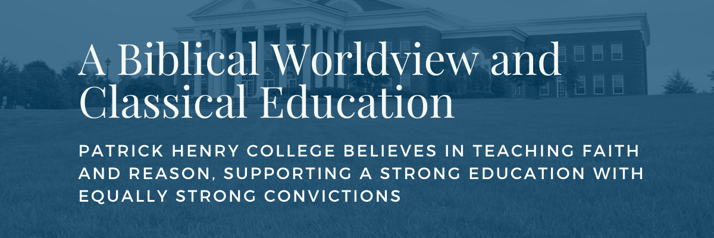
Two years ago, Faculty from both Patrick Henry College and Georgetown University began the "In Your Shoes" program, bringing together two ideologically opposite campuses. The idea was to try to bridge political differences by exposing common underlying human experiences... using theatre techniques.
If you think it sounds out-of-the-box, you're not wrong. The kinds of methods used for the program had been applied before in an attempt to build connections between rival people groups internationally. But for a conversation on politics? Dr. Cory Grewell from Patrick Henry College and Dr. Derek Goldman from Georgetown University wanted to see if they would work on students with conflicting worldviews.
Recently, the program caught the attention of PBS News. In the segment of PBS NewsHour below, the outlet examined the experiences of students from both campuses, including a 2020 graduate, Mikey Pozo.
"I did the best I could to present PHC well and, most importantly, to show the world the goodness of my Christ," Mikey said about his experience.
"I hope the Lord worked through me with what I had been given and with the words I was able to say. I hope this has opened a door for me to discuss further matters of my faith, my politics, and in general, my worldview. But again, it was all of you and the precious time you had spent on me, both in and outside the classroom, that has given me the tools to lead a nation back to Christ and shape a culture back to its roots."
Click below to watch!
In Your Shoes is a unique program, one that tries to get to the underpinnings of human interaction. Below is an excerpt from PHC's student newspaper, The Herald, from when the program originally took off. Published on February 8th 2019, the article provides a look into how In Your Shoes used unconventional methods to speak to the common ground we might not realize we share with other fellow Americans.
-----------
Cara Brown and Juli Meinz are on the stage in Town Hall, having a discourse on religion and the role it played in their childhoods. Brown is a Senior at Patrick Henry College and Meinz is a Freshman at Georgetown University. One is an extremely conservative institution; the other is an ideologically diverse and largely liberal school. They’re part of the “In Your Shoes” program on discourse between ideologically different parties.
Seems pretty simple on paper.
But this isn’t a conversation, or a debate, or a presentation—it’s more of an act. There’s a gentleman at the foot of the stage controlling the conversation. When he snaps his fingers, the conversation bounces to the other person, and when he claps, they start talking at the same time.
“Um…the way I grew up is like that we would casually go to church...” Brown begins.
Snap!
“Well I grew up in in this really interesting thing…like, I grew up doing….” Meinz says.
Snap!
“…on Christmas or on Easter...” Brown continues.
It’s like trying to watch two games of tennis by switching channels every few seconds. Sometimes the words line up so that you think by some happenstance the switching might result in one grand orchestration. At other points, the words sound like the random guesses of a crowd playing pictionary.
The conversation keeps going.
What is the point of all this?
Don’t get me wrong, it’s fascinating to watch, but it's hard to make heads or tails out of it.
In a word, it’s empathy.
“In your Shoes” is a program which takes five students from Patrick Henry College and five from Georgetown University and creates personal dialogue between the two groups. Dr. Derek Goldman and Dr. Daniel Brumberg, two professors at Georgetown, initiated the program in an attempt to create cross-cultural, cross-political dialogue by talking about people—not politics.
Goldman is a theatre professor at Georgetown and Brumberg teaches political science. The pair are implementing acting techniques to help students act and think like someone with a different set of beliefs to conquer the insurmountable political divide found in a 2019 United States.
It sounds unconventional—but the technique has been used before to bridge international social gaps. Brumberg hopes it will have the same effect here. It’s actually a pilot test for similar programs that may come in the future.
This week, the students have been reading each other’s recollections on the influence of religion in their early lives. That’s what the snapping is about. Brown is reading a copy of Meinz’s thoughts and Meinz is reading Brown’s. Brumberg is mixing the accounts and listening to the results. Despite the chaos, everyone can tell there’s a lot of shared vocabulary between the two narratives—there’s common ground here.
A bit later in the meeting, the students are asked to share a piece of music that’s meaningful to them.
One student shares how “Vienna” by Billy Joel reminds him to slow down in an often hectic and stressful college career.
Another shares how she can relate to the desire to tell stories presented by AJR’s “100 Bad Days.”
So far, there hasn’t been a single mention of policy, politics, red or blue. They’re just getting to know each other on a purposeful, meaningful level.
Dr. Cory Grewell, PHC’s point of contact between the two schools, believes that the personal drive of the program is central to restoring the basis of political dialogue.
“Most political dialogue sadly happens over Facebook, disembodied comments to people you don’t even know,” Grewell said. “You’re not even talking to people as human beings. [The program] is breaking down an obvious process in human dialogue. There’s a depth—there’s somewhere where you come from.”
The students have met together three times so far. Next time, they’ve been asked to list and share their top 10 values—however they may interpret that. It’s a work in progress, but already the groups have shared deep personal content with each other. While they may be ideologically diverse, the human element is winning out.
I’m sitting next to Dr. Brumberg as the group takes a brief break from the exercises. He’s got a set of glasses which cling desperately to the edge of his nose and a strong set of eyebrows that make him look like he’s perpetually thinking.
“What’s going through your head?” I ask him.
He pauses for a second before answering, wiping his mouth with the back of his hand.
“I’m thinking that the kinds of anxieties and concerns and dreams and worries that these people have are very similar. There’s this underlying rapport and language… What are some of the profound linkages here?”
He intends to try and find out.
-------------
Patrick Henry College believes in equipping the faith of its students with the reason of a classical liberal arts education. You're going to encounter a lot of ideas in the real world. Is your Christian faith or the faith of your student trained to respond? Click below to learn how PHC does just that.




